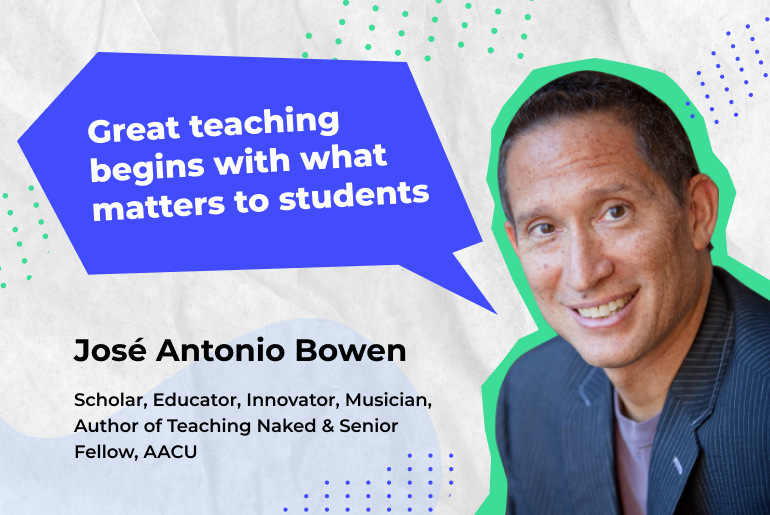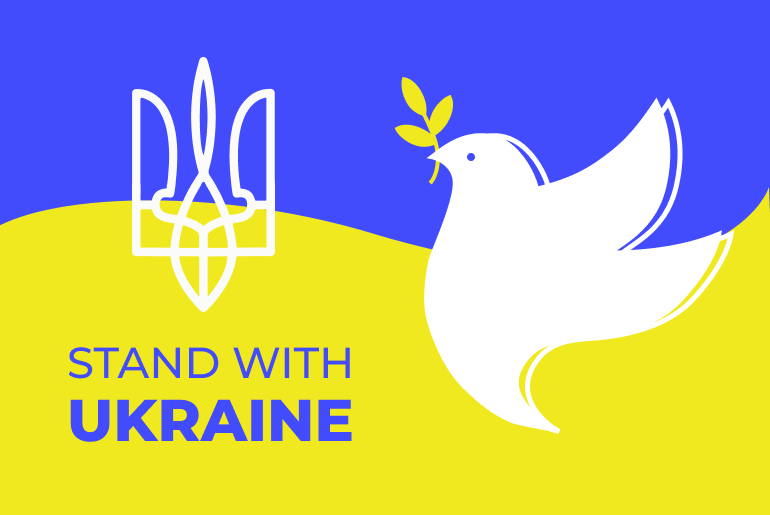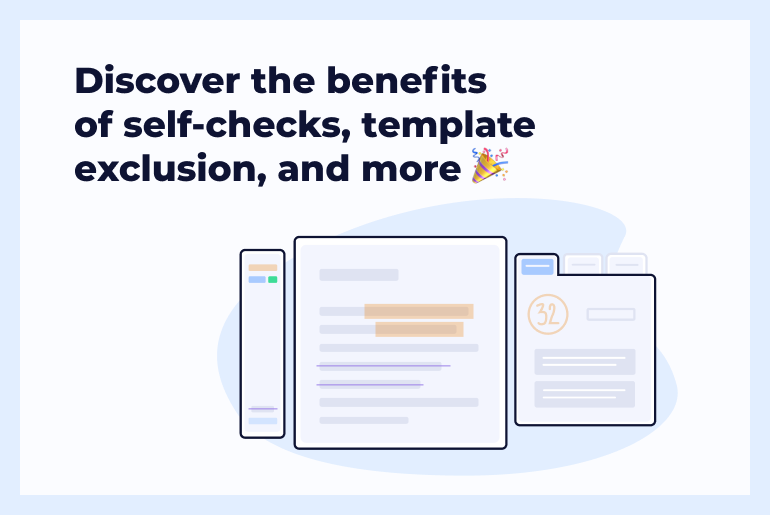Great teaching… Is it just a destination point no one can ever reach or a constant struggle to tailor pedagogy to the ever-changing times?
We’ve connected with Mr. José Antonio Bowen who’s been into examining teaching methods, faculty-student interaction, effective use of technology outside the classroom to get hold of what great teaching should be like.
Mr. José Antonio Bowen is juggling many roles, working as a scholar, educator, innovation consultant, and even musician. His book about A New 3Rs: Learning to Change through Relationships, Resilience and Reflection explores many practical opportunities for student engagement and disrupts our traditional perception of technology in higher education, which is a good point for any instructor to think about.
He favors the ability to change and shows how to benefit from it by his own example. As a former Goucher College President, Mr. José Antonio Bowen introduced video admissions for students, streamlined a process-focused curriculum letting students pursue their interests, and initiated a revitalization of the campus to better prepare students for the future jobs.
Let’s find out more about his take on the current state of higher education as well as some practical advice on the transformation needed.

Unicheck: In your Teaching Naked TEDx talk, you’ve raised the question of the real value of higher education – interaction, a face-to-face conversation between faculty and students. How has it changed recently? Is higher education today only about teaching students how to filter the irrelevant information on Google?
José Antonio: The recent COVID-19 crisis has only increased the importance of relationships, building community, and the idea of faculty-student interaction.
It is something we missed during the emergency learning move in spring. The shift online allowed faculty to still communicate their content. Those who lectured continued to lecture online, however, they discovered that an online lecture isn’t as good. Online learning can be great, think of the revolution that was Star Wars the movie, but what students actually got in emergency remote teaching was more like Star Wars the high school play.
A lecture isn’t the best form of learning – but at least you get a sense of a person, a faculty member, and a student who is there.
Students want community, engagement, experiences and that can be delivered online. But I do think that content is less important – it’s not unimportant, but we don’t need to say “these are your four years, so I need to give you lectures in physics because you’ll never get them again.” This is our opportunity to help students learn how to think, they will need content for that, but it isn’t the only essential. It has been prioritized beyond what it needs, so in the future the process has to take up a larger share.
Unicheck: In that very TED speech, you’ve mentioned that “technology should be part of the university strategy, not just a tool”. Could you spell out what you meant by saying so? In your opinion, how best to incorporate technology into the learning process and when it’s really necessary?
José Antonio: Technology is not just a tool, it’s part of the strategy. Technology by itself isn’t going to improve learning, but you still need to have some of that. So, the real questions for technology are: Where do you use it? When do you use it? And how do you use it?
There are some things that are better remote and some that are more suited for face-to-face classes. The real new trick of pedagogical design is figuring out what I need to do face-to-face, which is expensive, so I should put high-value things there and things that can only be done face-to-face. And what can be done in advance, e.g.: Can I do testing before students come to class? I’m convinced that we’ll see long lectures used less and less. Instead, there’ll be short video clips showing the content students can watch before the class.
Unicheck: One of your specialties is the assessment of students’ growth. What obstacles are educators facing when evaluating students? Is the traditional grading system still relevant? If not, what alternatives would you suggest?
José Antonio: Grades don’t really measure what we think they do unless they measure how much content you could remember in a short window. But grades don’t measure how much you remember in two weeks, they don’t measure how much thinking or growth has happened.
We need to think about this in a different way. Often what happens in all human efforts is that we measure what’s easiest and not what’s most important. But growth of students, their development, their potential, their critical thinking – those are indeed hard to track in a quantitative way, which is what our letter grades do.
So, we make qualitatively judgements all the time about people’s ability to do things rather than having to give them a grade. It’s really about prioritizing what’s most important, thinking differently about it and thinking what will help a student grow.
Part of the problem with grades and assessment structure is that it’s mostly done for external purposes – when we grade for creditors or assess for creditors or when we grade for graduate school, we’re just sorting. The thing that helps us learn the best, of course, is the tennis net – it provides wonderful assessment: immediate feedback without judgement, which is why it works. If you want to learn tennis, try learning without a tennis net… It helps you learn, it helps you get better, it also helps you know how well you’re doing, so that’s the sort of assessment we need to come up with for higher education.
Unicheck: Can educational technologies facilitate a grading routine and increase student engagement?
José Antonio: Educational technology can certainly help us increase our grading and student engagement, like the tennis net. The immediacy of technology is priceless. For example, in gaming when students find out that something doesn’t work and there needs to be another solution. In something that’s immediate you pay more attention, it’s more engaging. So, more, better, faster, less judgemental feedback is going to increase student engagement and technology certainly has a role to play here.
Unicheck: In your new book A New 3Rs: Learning to Change through Relationships, Resilience and Reflection you delve into the importance of relationships, resilience and reflection (3Rs) to teaching. Why are they so necessary for educators?
José Antonio: The book about a New 3Rs is also about learning to change. The point is that teachers, especially in faculty, were used to thinking that we can only know things in one way, things that are rational, things for which there’s evidence and data.
That’s certainly a powerful way of knowing. But people know things in other ways. Faith, for example. People know things because their community believes in them. We’re remarkably communal in how we think, which is great if you want to send them to the Moon or build an iPod. But it’s not a good thing if you want to learn how to change your mind.
If education is really about helping people learn to think for themselves and helping them regulate their own learning which is what I call this new learning economy where things are changing rapidly and your value as an employee is not what you know, but what you can learn. So, relationships, resilience and reflection are the things that you need to understand the process of learning.
Unicheck: On your blog, you’ve covered a bunch of today’s hot topics related to the pandemic. One of them provided alternative ideas for the fall semester. Do you personally think that remote learning has all chances to gradually transform into full-fledged online learning? What actions are required to make it happen?
José Antonio: I think there are two major effects of moving to emergency remote learning. The first is that some students would say: “Wow, it was much more convenient, I could watch things when I wanted to watch them, I had a good experience, there is a whole world out there.” The other one, however, is disappointment – people would think that if things didn’t work in spring, online learning doesn’t work or it doesn’t make any sense.
But the truth is most students and faculty haven’t experienced great online education. It can be as engaging as face-to-face education, but it’s radically different.
One of the big differences is that it takes advantage of asynchronous learning. I guess there are few people who are doing hyflex classes, because to simultaneously teach online and face-to-face is really hard. The positive side of online education is that it has opened for lots of people, faculty and teachers have learnt to use new tools like LMSs and Zoom. The question is whether they’ll get better at them and be able to do more than just a video conferencing.
Unicheck: How do you envision perfect teaching and learning processes? What should be done in the first place to get closer to this ideal picture?
José Antonio: The best teaching happens when you start with what matters to the student. Ultimately, the person who does the work, does the learning – it’s like push-ups. Watching someone else do push-ups is not that useful and this is true for intellectual push-ups as well.
What teaching is really about is figuring out what matters to the student and creating a path for the student to take and practice their own push-ups and get excited about their learning.
It’s impossible to teach someone something they don’t want to learn. Sometimes your job is to help make them want to learn that, which is very hard. But motivation and effort are key for learning and we often assume that everybody spends their perfect effort on it, but no, it’s teachers who think that because students did that. But most students don’t give their full effort on tests, they are not motivated to do homework.
The design of teaching should start with engagement, with what matters to students and then move them to what can help reach their own full potential. Relationships, engagement, safe sense of community, sense of caring – those things are prerequisites.
The irony we’ve learnt is that students can learn something, they can give you the right example, but psychology tells us that students need to accept themselves. There are all sorts of factors that lead us to be overconfident about what we would actually do. I’m convinced that the most important piece of education is to prepare students to be able to self-regulate their own learning, change their mind, think for themselves, and learn new things.





